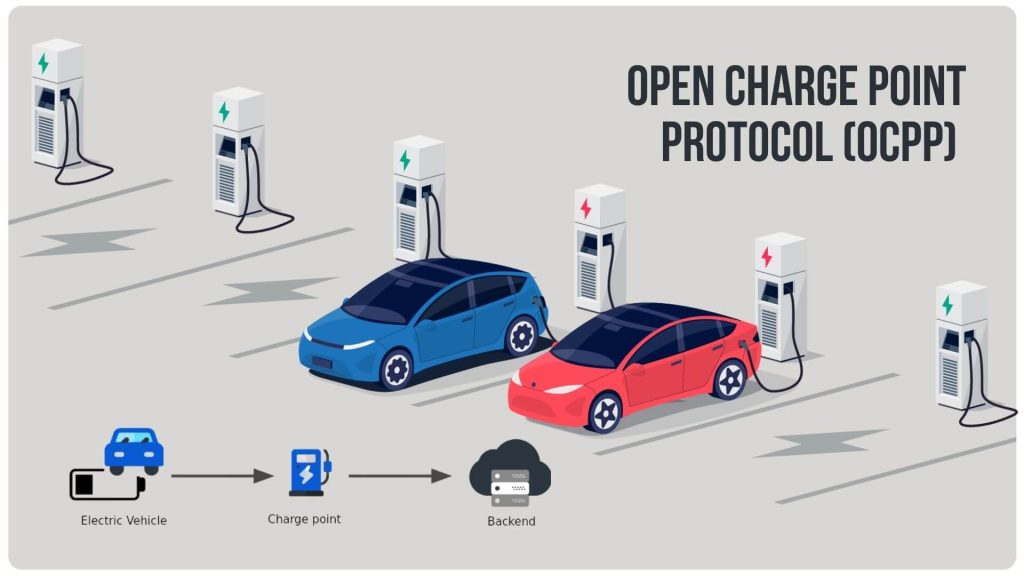
1.Abstract:
Electric vehicles (EVs) are gaining popularity worldwide due to their environmental benefits and technological advancements. To support the growing demand for EVs, a robust and standardized charging infrastructure is crucial. Open Charge Point Protocol (OCPP) plays a vital role in enabling interoperability and communication between charging stations and EVs. This project report provides an overview of OCPP, its key features, benefits, and its significance in the context of electric vehicles.
2. Introduction:
The transition towards electric mobility requires a reliable and efficient charging infrastructure. OCPP is an open and standardized protocol that facilitates communication between charging stations and electric vehicles. It ensures interoperability, allowing EVs from different manufacturers to charge seamlessly at any OCPP-compliant charging station. This report delves into the technical aspects, advantages, and implications of OCPP in the realm of electric vehicles.
3. Overview of Open Charge Point Protocol:
3.1 Definition and Scope:
OCPP is a communication protocol specifically designed for EV charging infrastructure. It defines the messages, data formats, and behavior necessary for charging stations and electric vehicles to communicate effectively. OCPP operates over various communication mediums, such as Ethernet, Wi-Fi, or cellular networks, enabling real-time information exchange between charging stations and EVs.
3.2 Key Features:
- Central System and Charge Point: OCPP defines two main entities, the Central System (CS) and the Charge Point (CP). The CS acts as the central management system, while the CP represents the charging station. Both entities exchange information and commands through OCPP messages.
- Basic Operations: OCPP supports fundamental operations like start/stop charging, retrieving, and updating charge point status, and managing transactions.
- Data Exchange: The protocol allows for real-time data exchange, including energy consumption, battery status, charging profiles, and authentication information.
- Smart Charging: OCPP enables advanced features like load balancing, demand response, and dynamic tariff management. These features optimize charging operations and support grid integration.
- Remote Monitoring and Management: OCPP allows operators to remotely monitor and manage charging stations. This includes firmware updates, diagnostics, and status reporting.
- Benefits of OCPP in Electric Vehicles:
4.1 Interoperability:
OCPP ensures interoperability between EVs and charging stations from different manufacturers. It eliminates the need for proprietary communication protocols and simplifies the integration of charging infrastructure into existing systems. This interoperability promotes healthy competition and encourages market growth.
4.2 Scalability and Future proofing:
By adopting OCPP, charging station operators can scale their infrastructure and accommodate a wide range of EV models without concerns about compatibility. OCPP’s flexible design allows for future upgrades and integration of new features, ensuring the longevity and adaptability of the charging infrastructure.
4.3 Advanced Charging Features:
OCPP supports smart charging capabilities, including load balancing, demand response, and integration with renewable energy sources. These features enable efficient charging, reduce the strain on the power grid, and promote sustainable energy usage.
4.4 Remote Monitoring and Maintenance:
The remote management capabilities of OCPP streamline the operation and maintenance of charging stations. Operators can monitor the performance, diagnose faults, and apply firmware updates remotely, reducing downtime and maintenance costs.
- Significance of OCPP in the Electric Vehicle Industry:
5.1 Standardization:
OCPP plays a crucial role in standardizing the communication between charging stations and EVs. Standardization simplifies the deployment of charging infrastructure, reduces costs, and enhances user experience. It fosters interoperability and encourages innovation in the EV industry.
5.2 Grid Integration:
With its smart charging capabilities, OCPP supports the integration of EV charging infrastructure with the power grid. It enables optimized charging schedules, load management, and integration of renewable energy sources, contributing to a sustainable and resilient energy system.
5.3 Future Market Expansion:
By providing a common protocol, OCPP facilitates market expansion and encourages the adoption of EVs. It enables charging station operators to serve a wide range of EV models, promoting the growth of the electric vehicle market globally.
6.Conclusion:
Open Charge Point Protocol (OCPP) serves as a vital communication standard for electric vehicle charging infrastructure. Its open and standardized nature ensures interoperability, scalability, and advanced charging features. OCPP facilitates the integration of charging stations into existing systems, simplifies remote management, and enables grid integration. By promoting standardization and interoperability, OCPP accelerates the adoption of electric vehicles, supporting the transition to a sustainable and cleaner transportation future.
11. References:
- https://evbox.com/us-en/understanding-ocpp#:~:text=What%20is%20OCPP%3F,any%20similarly%20OCPP%2Dcompliant%20software.
- https://en.wikipedia.org/wiki/Open_Charge_Point_Protocol
- https://www.chargelab.co/industry-advocacy/ocpp
- https://evocharge.com/resources/what-is-open-charge-point-protocol/
- https://www.kazam.in/category/blog/what-is-open-charge-point-protocol-ocpp-and-how-is-it-used-by-ev-charging-stations
Recent Posts
Have Any Question?
Lorem ipsum dolor sit amet, consectetur adipiscing elit. Ut elit tellus, luctus nec ullamcorper mattis, pulvinar dapibus leo.
